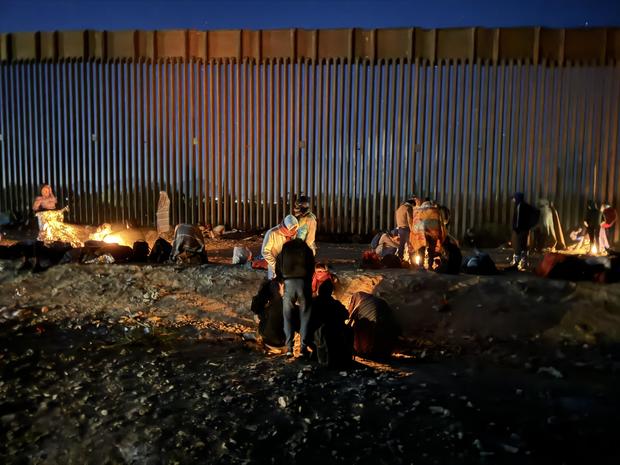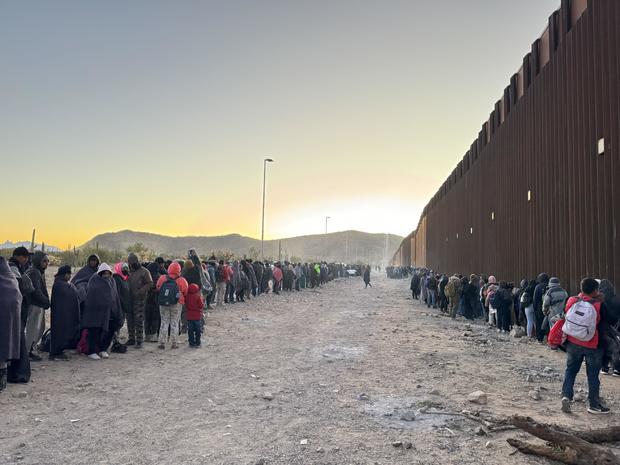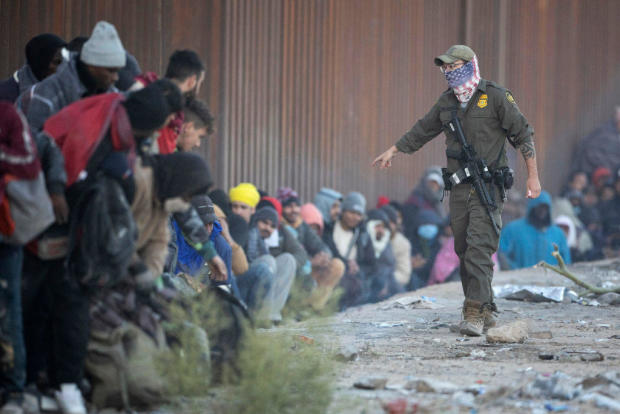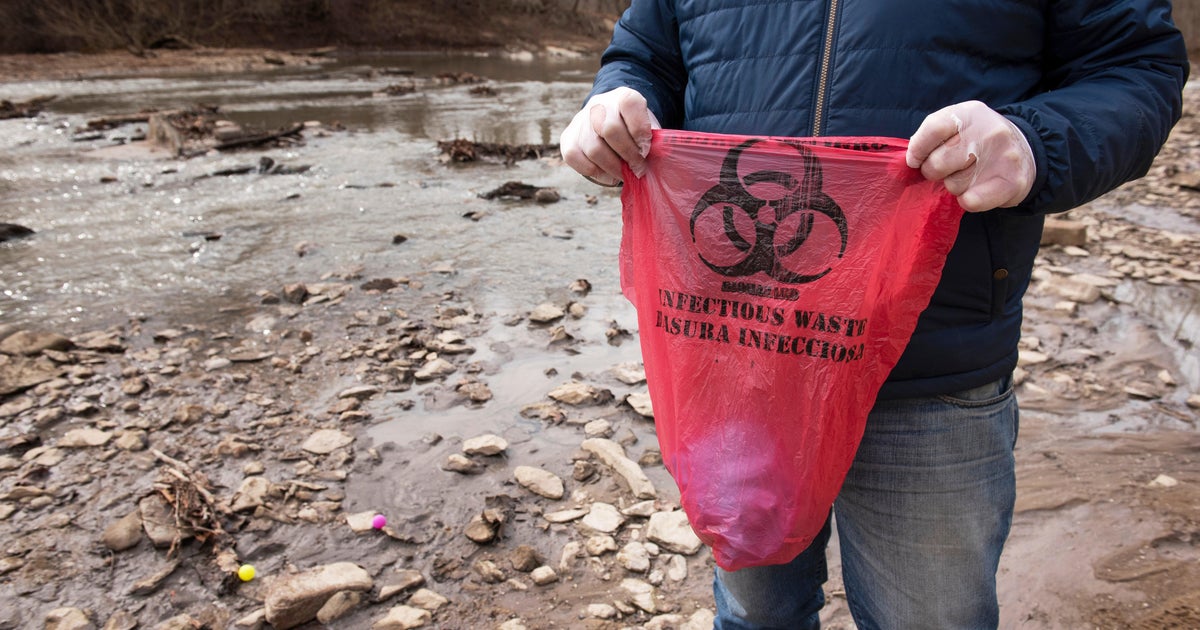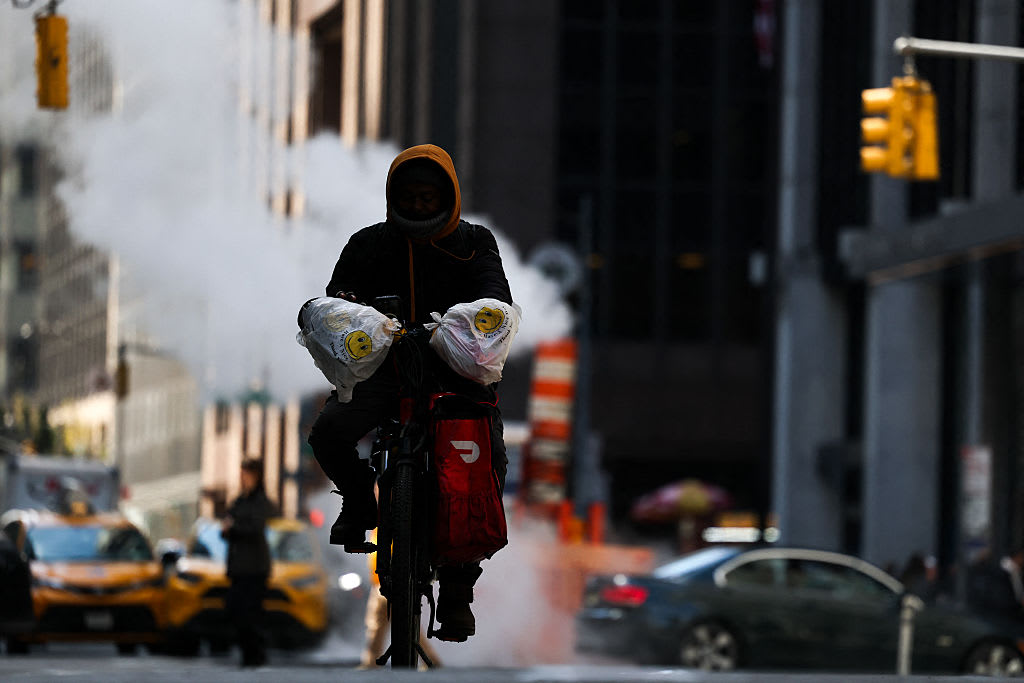Migrants from around the world converge on remote Arizona desert, fueling humanitarian crisis at the border
Organ Pipe Cactus National Monument, Arizona — A remote desert region along the southern border has become a makeshift international arrivals area for thousands of migrants from Africa, Asia and Latin America hoping to work and reunite with family members in the U.S.
Over the past few days, large groups of migrant men, women and some families with children have spent the night in a makeshift staging ground in this rugged section of the U.S.-Mexico border, waiting for overtaxed border officials to process them. Many expect to be released into the U.S. after being vetted by local Border Patrol agents, who lack the resources and manpower to screen everyone in a timely manner.
Most of the migrant men hailed from African countries, including Guinea, Mauritania, Morocco and Senegal, as well as some nations in Asia like Bangladesh, India, Nepal, Pakistan and Syria. Some men had left their hometowns in Ecuador and other parts of Latin America. The families traveling with children were predominantly Mexican and Central American.
The migrants set up fires at night and in the early morning hours to keep warm amid dropping temperatures. Many of them brought blankets to sleep next to the border wall. Without restrooms, they relieved themselves near the cacti that adorn the picturesque landscape of this national monument, located two hours away from the closest U.S. city.
The wait to be processed was so long in recent days that Mexican families and merchants traveled regularly to the staging ground to sell drinks and food, hoping to convince the desperate newcomers to buy their burritos, tamales and cups of coffee from the other side of the border wall.
Daniela Segura Salgado, 31, spent the night near the border wall with her four young children: a 1-year-old baby, her 3- and 9-year-old girls and an 11-year-old boy. The Mexican mother shivered as she carried her youngest, who was covered by blankets.
"We didn't sleep like we should," Segura Salgado said in Spanish, referencing the dropping temperatures overnight. "But sleep would win me over at times because I'm really tired from a lot of walking with my children. My son in my arms and my daughter up on my shoulders."
The chaotic and striking scenes at the outdoor staging area in the middle of the Arizona desert illustrate the dire humanitarian implications of the crisis along the southern border, where migrants have been arriving in greater numbers and from more countries than ever before in U.S. history.
For only the second time ever, Border Patrol apprehended more than 2 million migrants who entered the U.S. illegally in fiscal year 2023. Defying historical seasonal trends, illegal border crossings have spiked this month. Over the past several days, Border Patrol has processed near-record levels of migrants, making roughly 10,000 apprehensions every 24 hours, up from the 6,000 daily average in October, according to internal government data obtained by CBS News.
"I've been working in this sector of the border for almost 20 years, and we've never seen anything like this," said Dan Abbott, a local volunteer with the group Humane Borders, which distributes water and food inside the Organ Pipe National Monument, hoping to prevent migrants from perishing in the treacherous terrain.
"Something better"
Some of the African and Ecuadorian men who were lined up waiting to be taken into custody by Border Patrol said they had embarked on days and weeks-long journeys across Latin America to find better opportunities in the U.S. They cited the deteriorating economic and security conditions in their homelands. Some mentioned they had family members in different states like New York and Texas.
Economic misfortune and a desire to reunite with relatives are not grounds for U.S. asylum, which can only be granted to migrants fleeing persecution based on certain factors, such as their race, religion or political views.
Over the past few years, however, the U.S. asylum system has become a proxy process for migrants to stay and work in America, irrespective of whether they have valid claims or not. A mounting backlog of roughly 3 million pending cases has crippled the federal immigration court system's ability to adjudicate claims in a timely fashion.
Most migrants are not screened for asylum at the southern border anyway, federal statistics show, since the government does not have sufficient asylum officers, holding facilities and other resources to interview asylum-seekers under a process known as expedited removal. Consequently, most of those who are not deported are generally released with court cases that typically take years to complete.
Some migrants braving the elements in the Arizona desert said they were escaping dangerous situations.
Segura Salgado, the migrant mother from Mexico, said she came to the U.S. due to the violence in the Mexican state of Guerrero, a region plagued by violent crime and drug trafficking. She said a relative was recently killed there.
"I am fighting as much as I can so my children can have something better. A warm bed where they can sleep without having to hear a gunshot," Segura Salgado said.
A daily battle against smugglers
The spike in migrant crossings comes as Congress debates an overhaul of the asylum system.
Republicans have capitalized on the unprecedented levels of border crossings to demand sweeping asylum restrictions as part of ongoing negotiations over President Biden's multi-billion-dollar national security funding request, which includes aid to Israel, Ukraine and Taiwan. GOP lawmakers have said they will not support additional assistance to Ukraine unless the bill includes asylum restrictions.
The dynamic could pave the way for the first overhaul of the U.S. immigration system since 1996. But the talks could also meet the same fate of previous failed immigration reform efforts over the past two decades.
Over the past year, the Biden administration has sought to manage migration at the southern border through a strategy that pairs stricter asylum rules for those who enter the country illegally with expanded channels for migrants to come legally, including by launching an app that allows them to get appointments to be processed at ports of entry.
While officials credited the strategy for a two-year low in illegal border crossings in June, unauthorized migration has increased sharply since then, frustrating Republican lawmakers and Democrats in communities struggling to house the new arrivals, such as New York City and Chicago.
In a statement, Customs and Border Protection said it was surging staff and resources to the Arizona desert and targeting transportation companies used by smuggling organizations to shuffle migrants near the U.S. border.
Border Patrol agents battle those smuggling organizations every day. In the Organ Pipe National Monument, for example, the movement of migrants is rarely organic. It's typically organized by a network of smugglers in Mexico who cut parts of the border wall to let groups of migrants into the U.S.
Just a few miles away from the outdoor staging area, dozens of migrants streamed through a small breach in the border wall. They started running after the suspected smugglers told them that reporters were filming the scene. The last to make their way through the breach were parents traveling with young children. The children smiled as they ran.
"They're filming!" one of the suspected smugglers said before running away and disappearing across a nearby Mexican highway.
The scene was not an anomaly. Border agents and contractors repair wall breaches on a daily basis, but they struggle to keep up with the smugglers.
Right next to the part of the wall that had just been breached was a bollard with a label indicating that it had been repaired earlier in the day.

